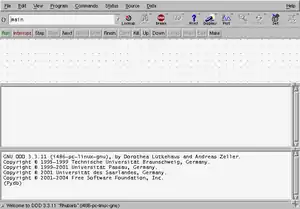Data Display Debugger
Data Display Debugger (GNU DDD) is a graphical user interface (using the Motif toolkit) for command-line debuggers such as GDB,[2] DBX, JDB, HP Wildebeest Debugger[note 1], XDB, the Perl debugger, the Bash debugger, the Python debugger, and the GNU Make debugger.[4] DDD is part of the GNU Project and distributed as free software under the GNU General Public License.
 | |
| Developer(s) | GNU project |
|---|---|
| Stable release | 3.3.12
/ February 11, 2009[1] |
| Operating system | Linux, FreeBSD, NetBSD, OpenBSD, Tru64, UNIX |
| Type | graphical front-end |
| License | GNU GPL |
| Website | www |
Technical details
DDD has GUI front-end features such as viewing source texts and its interactive graphical data display, where data structures are displayed as graphs.
A simple mouse click dereferences pointers or views structure contents, updated each time the program stops. Using DDD, you can reason about your application by watching its data, not just by viewing it execute lines of source code.
DDD is used primarily on Unix systems, and its usefulness is complemented by many open source plug-ins available for it.
Notes & references
References
- Wainwright, Peter (2009-02-11). "ANNOUNCE: DDD 3.3.12 (Dale Head)" (Mailing list). ddd. Retrieved 2012-12-08.
- Matloff, Norman; Salzman, Peter Jay (2008). The Art of Debugging with GDB, DDD and Eclipse. No Starch Press. ISBN 9781593271749.
- HP. "HP WDB". Archived from the original on September 7, 2015. Retrieved December 9, 2012.
- GNU Project - Free Software Foundation (FSF) (5 May 2011). "DDD - Data Display Debugger". Retrieved December 8, 2012.
Notes
- The HP Wildebeest Debugger (WDB) is an HP-supported implementation of the GNU Debugger and is available as free software from HP for PA-RISC and Itanium systems.[3]
See also
- Debugger front-end
- KDbg, a KDE debugger front-end
- ups (debugger)
- Xxgdb, an X Window System debugger front-end